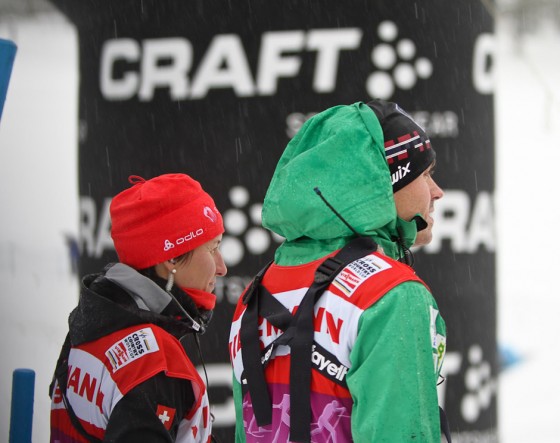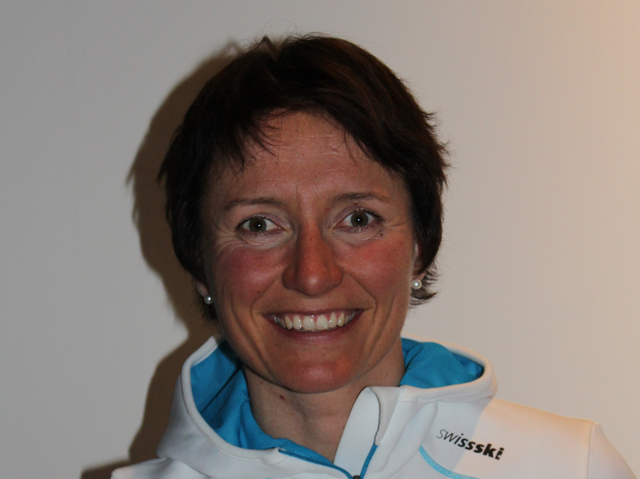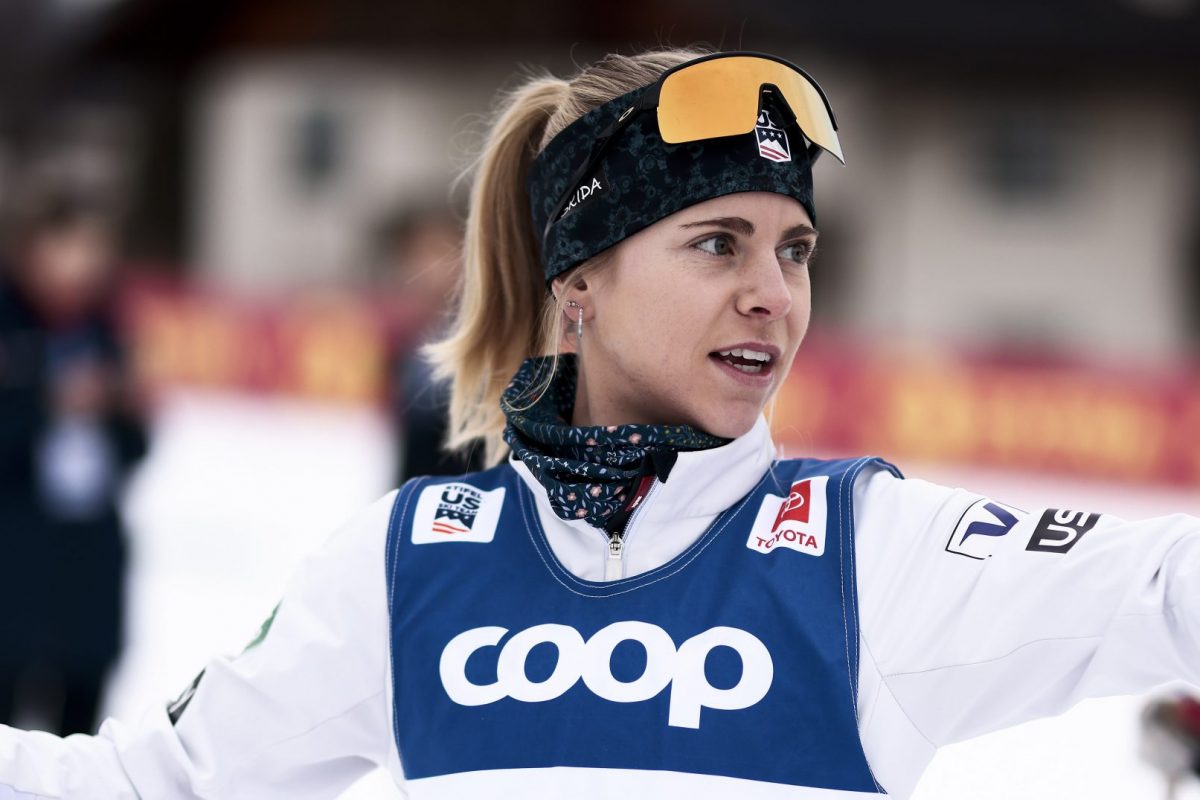
At the 2014 Sochi Olympics, Switzerland’s Dario Cologna won nearly half of the events he competed in, taking home two gold medals out of four individual races and a team sprint. In the classic team sprint, he combined with his younger brother Gianluca to place fifth out of 21 teams — not a bad showing for Switzerland.
So it came as a bit of a surprise when the team’s head coach, Guri Hetland, parted ways with the Swiss-Ski association earlier this month after four years at the helm and Cologna’s personal coach.
But differences in opinion arise, negotiations don’t always go as one might hope and change ultimately happens. Hetland, 39, perhaps knows that better than most.
On the phone Monday from Meråker, Norway, a village where Hetland and her husband Tor Arne have a cottage about an hour east of Trondheim, Hetland told FasterSkier that she and her husband consider themselves global thinkers — up for anything and everything, wherever in the world that might take them (Switzerland’s sprint coach for the last four seasons, Tor Arne did not have his contract renewed earlier this spring. Soon after, he secured a job as World Cup coach of the Canadian National Team.)
Hetland talked about what she’s been up to since her contract with Swiss national team ended, which was publicized in a Swiss-Ski press release on May 10. Her departure from the team was immediate, and not long after, Hetland headed from her home in Davos, Switzerland, to Norway to “talk to some people” and line up job opportunities for the future.
Later this week, she’ll return to Davos, where she’ll reunite with her husband after his first training camp with the Canadian team in Banff and Canmore, Alberta.

FS: What have you been up to?
GH: I had some meetings [in Norway] and also I’m doing some management work for Marit Bjørgen this week. I’ve been doing that since 2005. I used to go to Norway to do that kind of work and now I combine working with her with some more days looking on future job opportunities for myself. I’m her manager so I’m doing her sponsorship strategy and negotiating her marketing contracting, her sponsoring contracts and also following up all of her sponsoring and marketing activities.
FS: Do you manage any other athletes?
GH: She’s the only one. [Since] I started working in Switzerland in 2010, that’s been a part of the deal that I’m allowed to do that work. It has nothing to do with sport and training — it’s the business part of Marit’s career. It hasn’t been a conflict between being responsible for the team in Switzerland and taking care of her business.
FS: How have the last couple weeks been for you?
GH: It was kind of different or kind of changing, suddenly changing. I had planned to work longer in Switzerland and I hoped and I thought that we could agree on the proposal and that I could get the same, more or less the same responsibility that I had before, but my bosses in the ski federation wanted some changes. They wanted to do a strategy change and a structure change, and they wanted me in another position than I had before. I figured out in this new position it would be hard for me and not motivating enough for me to work and do a good job. I saw my future is not the Swiss cross-country team and the consequence is quit and I’ll find challenges somewhere else. That’s the situation right now.
“They wanted me in another position than I had before. I figured out in this new position it would be hard for me and not motivating enough for me to work and do a good job. I saw my future is not the Swiss cross-country team and the consequence is quit.” — Guri Hetland, Swiss national team head coach from Oct. 2010-May 2014
FS: What was the dispute?
GH: Until now or the last four years, I had a really big responsibility being the head coach. I’ve been taking care of the training philosophy and also the selection stuff and more or less everything on top level. In this new structure they wanted to separate the responsibility so they wanted another person to take care of the coaching or the training strategy and they wanted me more to take care of the administration and the organization and not that much about training. For me, it was not really satisfying. It was less responsibility and I felt it was too much of a manager job or organization job and less of a coaching job.
FS: How did you feel about having so much responsibility before?
GH: I was quite happy with the structure. Switzerland is a small cross-country team so it’s possible to be a coach and at the same time do some organizational stuff. I think that worked well for me and it made it also for me interesting to have the responsibility, not only the coaching but also more administration or lower-management things. For me, that was a good solution.
FS: Did the Swiss coaching structure change at all while you were there? Did it change when you were hired?
GH: No. It’s been quite the same for four years. I came in October [2010] because the former coach was fired and I came and I started to work in October, that’s not the perfect time to start with a new team so I used the winter to get to know the athletes and I could really start systematically working with them in the spring ’11. The structure has been the same all the time and it was also more or less the same before I came into the team.
FS: What was your sense about the coming changes after this past Olympic season?
GH: We started discussing in the middle of March and then they told me they wanted to do some changes and they want to have more Swiss people in leading positions. I thought that it would be possible to negotiate and to get more responsibility back and to find a good solution for both parts but they were not interested in moving it in my direction, so yeah, we discussed that for some weeks then I was told it was no chance to get the position I wanted to have. Then I realized the best thing would be to break up or to quit the corporation.
For sure after an Olympic period it’s the time to do some thinking and maybe do some strategy or structural changes and I respect that the bosses wanted to do that … I wanted another solution, but I had to accept and respect that they had other thoughts and ideas than I had. It’s no hard feelings. For me, it was OK — I had to stay true to my philosophy and my wishes and if I have the feeling I’m not able to do a good job in this new position, then I’m not doing it. It’s better for the team and also for me. Then it was clear to me that will also be the solution.
“I thought that it would be possible to negotiate and to get more responsibility back and to find a good solution for both parts but they were not interested in moving it in my direction … I had to stay true to my philosophy and my wishes and if I have the feeling I’m not able to do a good job in this new position, then I’m not doing it. It’s better for the team and also for me.”
FS: What about the Swiss hiring Ivan Hudáč, a Slovakian coach, to coach the World Cup team and Dario Cologna’s training group?
GH: He will the primary coach of that group or the training group, around the best athletes, but he will not be the head coach [of the Swiss national team]. A Swiss guy will be the head coach, but he will be coaching the U23 team, so yeah, it changed structurally. Ivan will be replacing Tor Arne [former sprint coach] and now they will search for a new coach to work together with him and the training group of Dario and the best guys [on the World Cup].
FS: Why do you think Dario wanted a change?
GH: I think it’s important to always develop and improve what you’re doing, also for Dario. These changes could have been done with building in some new resources and persons, still with me in lead, but it could also be done with changing the manpower totally. As I said, it was necessary to find a new coach to replace Tor Arne and they picked Ivan and that’s a really good choice. I know him as a really good guy and a good coach and I think he will be a good coach for the team and I think he will also give Dario some new input. At the same time, Dario is experienced as an athlete and he knows what to do, he knows what he has to do to develop further and stay on top. I’m not concerned about his development. I think it will be positive for him to get some new input and some new ideas.
FS: Did you ever feel like your gender had anything to do with the team’s decisions?
GH: No, I’ve never felt that. I always felt I’m getting respect for the work I’m doing and it’s not at all about the gender. I don’t look at gender as this special thing, you need some qualities and knowledge to be a coach and have such a position and those qualities, they are not male or female, it’s about who you are and how you’re working. I never had a feeling it’s different for me or harder for me because I’m a female.
FS: Back to working with your husband, how did you two split the coaching responsibilities? Were you both working with Dario?
GH: I was working with Dario. [Tor Arne and I] were coaching the World Cup team together and he was taking care of the sprinters and I was taking care of the distance athletes. I was coaching six men and he was coaching three men and a lady and also taking care of all the sprint issues around the entire team.
FS: How was working with Tor Arne for the last four years?
GH: It was working really good. It was a little bit challenging in the beginning to find our roles and to clear our positions and how to work and how to separate work and our private lives, but after some time it really worked good. The last two, three seasons have been really good and we have managed to separate the tasks between us and also separating job and private life.
FS: What made him a good coach?
GH: He’s really dedicated. He knows really well what it’s about to be a cross-country skier on that level. He experienced himself what it is. He is having a much knowledge and he is always developing himself. He is creative and he is always putting the athletes and the athlete’s needs in center. He’s hardworking … he puts high demand on the athletes, but also getting a lot of himself and always trying to develop. He has good ideas about training.
FS: What was your reaction to him getting a job with the Canadian team?
GH: My first reaction was: it sounds interesting! I know some of the guys and I know Justin and I know it’s a really good group of people. I think they’re also hard working in many ways and their work will fit good with Tor Arne’s philosophy and way of working. For him it’s a new challenge. They’re really good athletes and some athletes haven’t really brought out their potential the last year or the last years, and it’s for sure challenging to try to improve and together with Justin develop these athletes further. The Canadian team seems to be one of the most interesting teams to coach. Tor Arne also thinks it’s a positive and new challenge to work in a new country again and learn about a new country and how things are working in Canada.
FS: Why do you think Canada is one of the most interesting teams?
GH: It’s really good athletes. My impression is they are really hard working. They’re motivated, they want to do their best, and they put really much effort into what they’re doing and they have had some really good results, but not stable, good results, so I think the challenge is to do some smaller changes to make them improve or make them develop further and make them more stable and perform at the top level.
FS: What are your thoughts on the Canadian system?
GH: I think you should talk to Tor Arne about that because he is having his first training camp with the Canadians now and he is on his first real trip with the team now. My impression of Canada and the team, I have it from World Cup and talking to Justin and the athletes, so I don’t know really much about them, but it seems to me to be a really interesting group and that’s also what Tor Arne has been saying.
FS: Would you like to continue coaching or are you interested in other jobs?
GH: I’m looking to other things as well. I have decided to use this upcoming month to figure out what I want to do or where I want to spend the main part of my job and time in the future, and I have no hurry. I’m speaking with some people trying to figure out what are the opportunities and first of all, what do I want to do. For sure, I will continue to work with Marit and that’s keeping me kind of busy, but that’s not a full-time job, that’s just something I’m doing on the side. So I think maybe in a month or even a little bit more then I know where to put my energy and my efforts in the next time.
“I have decided to use this upcoming month to figure out what I want to do or where I want to spend the main part of my job and time in the future, and I have no hurry.”
FS: Would you like to stay in Davos or are you open to moving?
GH: I’m open. I really, really like in Davos and we’re living there and we have no other plans right now but both Tor Arne and I we are both kind of global thinking. We can stay everywhere and we can also stay sometime here and sometime there. The most important thing for me now is to find out what I want to do and then we will also find out if it’s practical, better to go on living in Davos or is it better to move somewhere else. Right now I have no other plans than staying in Davos. Pretty open.
Alex Kochon
Alex Kochon (alexkochon@gmail.com) is a former FasterSkier editor and roving reporter who never really lost touch with the nordic scene. A freelance writer, editor, and outdoor-loving mom of two, she lives in northeastern New York and enjoys adventuring in the Adirondacks. She shares her passion for sports and recreation as the co-founder of "Ride On! Mountain Bike Trail Guide" and a sales and content contributor at Curated.com. When she's not skiing or chasing her kids around, Alex assists authors as a production and marketing coordinator for iPub Global Connection.



